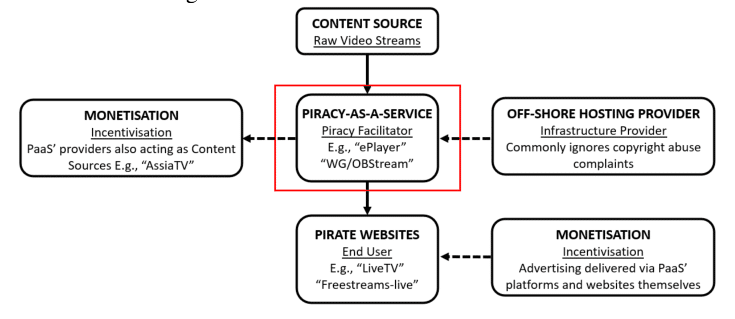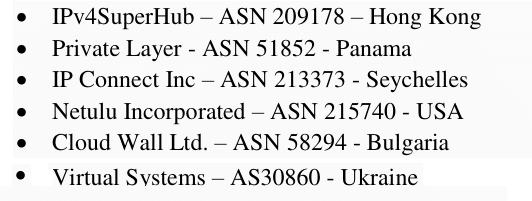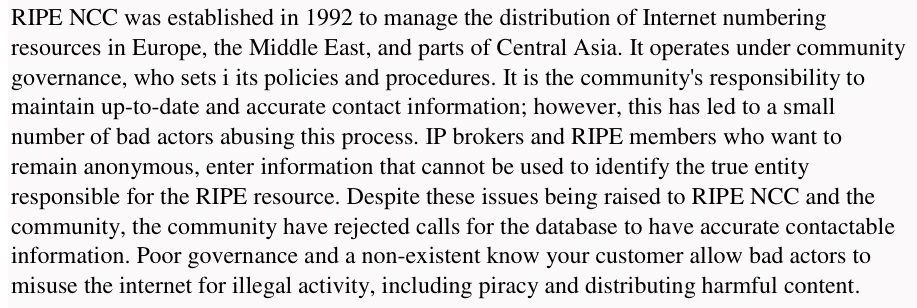 For those interested in how policy takes shape under pressure from a constantly adapting piracy landscape, submissions to the USTR for its annual review of ‘notorious markets’ often carry clues on the performance of current strategies.
For those interested in how policy takes shape under pressure from a constantly adapting piracy landscape, submissions to the USTR for its annual review of ‘notorious markets’ often carry clues on the performance of current strategies.
Beyond the work of the USTR, some issues raised in submissions aren’t easily fixed but can develop into topics for wider discussion. A joint submission by broadcasting group beIN and Miramax, a company jointly owned by beIN and Paramount Global, recommends the addition of four relatively low-profile pirate entities to the 2025 list.
While the USTR could justify their inclusion based on the submission, another component that we’ll address in a moment seems likely to spark wider discussion. As beIN informs the USTR, underlying problems in some regions render enforcement all but impossible, and since other anti-piracy measures are no longer considered effective, options are limited.
Persistent Threats
In common with previous submissions, beIN begins by calling out countries where IPTV piracy continues to cause significant issues.
From the tone of the report, some Iraqi internet service providers have now fully embraced the opportunity to add value to sales of basic bandwidth by bundling “virtually unlimited” access to pirated content. Calling out MyTV+, Vodu, Veo, Cinemana, Cee, and Cinema Box by name, beIN stresses that these aren’t independent services; they’re an integral part of the ISPs’ subscription broadband packages.
“The biggest offenders are Newroz Telecom / Fast Group and Earthlink Group, with additional facilitation by Shams Telecom, Halasat and HRiNS. These ISPs are not merely tolerating piracy but are directly responsible for operating and monetizing it,” beIN explains.
In the north of the country, services including Chaloos, Mediastar and Forever TV remain persistent threats, with the latter presumably able to turn a profit on subscriptions as low as $38 per year. Family Box also receives a prominent mention as a particularly troublesome supplier; around a third of pirated beIN streams display the Family Box logo in the corner.
More generally, beIN says there’s a problem that persists across much of the MENA region, regardless of borders. Piracy has become so entrenched it’s conducted out in the open; from sales of Spider-branded devices in Jordan to purchases of Chinese pirate devices from UAE’s Dragon Mart, the effect of legal action is temporary at best.
The Enforcement/Evasion Cycle
The USTR’s focus in 2025 is piracy of live sports broadcasts and on that front, beIN and Miramax offered information that they believe the USTR will find useful.
In our view, while much attention is often directed to individual websites offering pirate content, this is not always the best way to seek to tackle the problem. The website landscape can be very fluid, with new domains and websites continuously being created, often in order to evade enforcement. Regrettably, the structure and nature of the internet means this is relatively easy, and the task of enforcing against individual websites extremely challenging.
While beIN refrains from using the term ‘site-blocking’, the appearance of new domains and the continuous spawning of new websites are classic signs of blocking countermeasures.
During the summer, DAZN obtained perhaps the most aggressive blocking injunction ever issued by a court, with rules of engagement heavily in favor of DAZN. It’s likely the campaign caused disruption but exactly how much is hard to say. DAZN blocked over 500 domains in a matter of weeks, but the job still wasn’t finished.
Time to Refocus
The alternative proposed by beIN isn’t new, and as an enforcement measure, it faces its own set of challenges.
“Companies known as ‘hosting providers’ or ‘dedicated server providers’ are central to the piracy problem because they make it possible for pirates to operate online. Without such hosting, pirates would be unable to distribute their content. beIN, like many owners of live sports broadcast content, routinely monitors the internet to identify these providers by using publicly available databases managed by regional internet authorities,” beIN reports.
Once beIN identifies a platform offering its pirated channels illegally, the company contacts the platform’s hosting provider, sends a takedown notice, and those respectful of the DMCA usually process them. The problem for beIN is that among pirate sites there has been a “huge shift” towards so-called ‘off-shore’ or ‘bulletproof’ hosting providers that do little or nothing in response to takedown notices.
For background, the image below supplied by beIN shows a typical live sports streaming piracy setup.

In this example, beIN says the Piracy-as-a-Service platforms in the center (red box) supplied MLB, NBA, NFL, NHL content to over 270 pirate websites, together generating 3.2 billion visits between July 2024 and June 2025.
These PaaS providers are the unseen enablers, offering bad actors the technical infrastructure to deliver infringing content. Their services, which may include the direct supply of video streams, the use of ‘off-shore’ hosting to evade abuse complaints, and the constant acquisition of new domain names to bypass site-blocking, are designed to ensure a high degree of anonymity and secrecy. This makes it difficult to enforce against and to trace those responsible for tens of thousands of infringements.
The PaaS platforms identified by beIN (ePlayer, Aliez, WG/OBStream, and Cast/Hoca) are not as widely known as the branded user-facing sites they serve, but their contribution to the piracy ecosystem is significant in this case. The problem for beIN is the unresponsive nature of the off-shore/bulletproof providers that host the PaaS platforms (beIN’s examples below), in particular their tendency to disregard DMCA notices.

Criticism of RIPE NCC
In a ‘normal’ environment, beIN would be able to identify the hosting provider by its ASN and IP addresses which are allocated by an organization called RIPE (RIPE NCC in Europe).
If the hosting provider was Amazon, for example, beIN could obtain the specific contact information held by RIPE NCC (most likely after obtaining a court order), put pressure on Amazon, and then the PaaS platform would probably get taken down. In extreme circumstances beIN might even sue, or at least that would be an option.
“Poor governance and a non-existent know your customer”
In the case of off-shore/bulletproof providers, beIN says that identifying the owner of an ASN using information held by RIPE NCC can prove impossible.
“RIPE NCC requests its members or those who use RIPE NCC resources to provide accurate contact information. Some rogue providers abuse this system by posting false or incomplete information. This prevents rights owners and authorities from reaching them or successfully sending takedown notices,” beIN explains.
Inaccurate information can include fake or unmonitored email addresses, false business addresses or shared locations with many tenants. This ultimately makes it impossible for beIN to identify the owners of off-shore hosting companies. If it’s unable to do that, targeting the operators of the PaaS platforms becomes impossible too.
“In other words, the very concept of an offshore or bulletproof hosting provider seeks to rely on the ease by which this registration system can be misused through the provision of false or incomplete information,” the company adds.
beIN’s Lee Kent and Andrew Willatt from the Premier League aired their grievances at the RIPE 89 event last year. In a full presentation (pdf) they laid out how RIPE NCC and its community could help.
The official minutes are inconclusive, but in light of beIN’s submission to the USTR, it’s likely that the parties still don’t see eye to eye.

The beIN and Miramax submission to the USTR is available here (pdf)
From: TF, for the latest news on copyright battles, piracy and more.
Powered by WPeMatico
